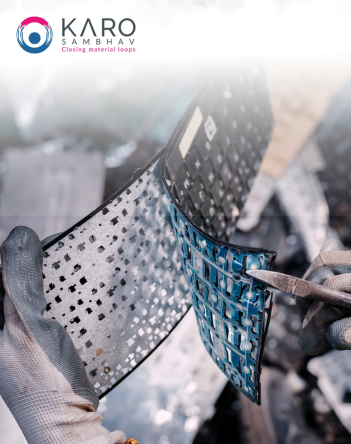Karo Sambhav collaborates with leading organisations to jointly develop industry frameworks, standards, governance mechanisms, systems and processes that advance the transition to circular economy. know more about our alliances.
Lead-acid batteries need no introduction. As a primordial example of rechargeable batteries, lead-acid cells have been powering many appliances and grid-scale power systems for decades. Did you know that these batteries have been used as ignition power sources for automobiles? Why just automobiles or UPS systems? Lead-acid batteries play a pivotal role in backup power supplies supporting the massive phone towers. In short, lead-acid batteries electrify every appliance and power-systems we are familiar with. Unfortunately, this also implies that the amount of battery waste in landfills is increasing. Throwing away batteries certainly seems harmless. Little do we realise the menacing impacts of trashed batteries on the environment. Do you wish to learn how to dispose batteries in India the correct way? Let’s explain:
Before reading about the battery waste rules, isn’t it worth understanding how lead-acid batteries contaminate the environment in the first place? The high amounts of lead components stuffed into lead-acid batteries are one of the primary environmental issues with these batteries. As per statistics, atypical lead-acid battery comprises 60%–80% lead and plastic components, both of which are extremely hazardous. Besides, the batteries also contain a good amount of sulphuric acid, which is equally detrimental.
If you are not already aware, lead is a heavy metal, and sulphuric acid is highly combustible. The social impact and environmental consequences of the mindless trashing of lead-acid batteries are far more than you can imagine. Did you know that the slightest spillage of lead contaminates the earth and groundwater in no time? The baneful elements actively contribute to the plumes of pollution in soil, air, and water. Of course, we are not ignorant of the planetary crisis we are combatting. From climate disruption to the shocking loss of biodiversity, human health hazards, and pollution, the odds are truly high. A simple initiative such as responsible recycling of batteries, plastics, and electronic wastes can work wonders in healing the planet.
Are you still curious to learn about the adverse impacts of lead-acid batteries? Let’s look at a few:
1. The chemicals, especially lead, replete in the batteries leak into the environment, tarnish the groundwater, and threaten aquatic life.
2. Battery components, such as sulphuric acid and lead sulphate, are extremely corrosive. Therefore, too much spillage or exposure flames up the landfills and pollutes the air.
3. Are you aware that ingestion of lead is malignant and sometimes lethal? The leakages, explosions, and lead particles in the environment contaminate the food you gulp and the water you drink. Lead is extremely toxic for humans and wildlife. Here’s what in haling and ingesting lead can do:
· Spike neurological issues
· Slowdown brain development in young toddlers
· Decrease fertility in animals
· Affect the growth of plants
· Increase behavioural abnormalities in humans
· Cause hearing issues, anaemia, and more
Thus, it is undoubtedly a no-brainer that responsible recycling of lead-acid batteries has become critical in recent times.
Now that you have a little idea about the awful environmental and health impacts of lead-acid batteries, let’s reflect on how to dispose batteries in India correctly.
Frankly, the only acceptable and known method of disposing of lead-acid batteries the right way is by recycling them. Since reaching out to licensed smelters is not a practical solution for individuals, gathering all spent batteries in one place and returning them to authorised battery recyclers is a good idea. If there is a designated hazardous waste zone in your area, do not shy away from stacking all your batteries and electronics in the designated trash pile.
Karo Sambhav, a leading Producer Responsibility Organisation in India, is going all out to maximise battery waste recycling. The organisation is committed to establishing delegated collection centres to not only recycle but also salvage and repurpose the components in batteries for newer production of batteries and other products in demand. The process is referred to as recovery of secondary materials.
Although a worthy way to tackle the disposal of batteries, responsible recycling is not efficient enough to eradicate the critical planetary crisis. Little do consumers and manufacturers realise that almost 99% of the components in a lead-acid battery are recyclable. Careless dumping and inefficient handling of the spent batteries keep increasing the mining of natural resources, thereby exhausting the finite resources in store. Circular economy is an upgrade of the standard battery waste rules. The strategic initiative aims to keep the resources in a closed loop for a longer tenure.
Karo Sambhav collaborates with leading organisations to jointly develop industry frameworks, standards, governance mechanisms, systems and processes that advance the transition to circular economy. know more about our alliances.





